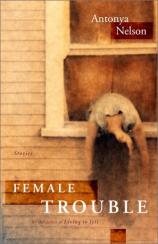Reading Group Guide
Discussion Questions
Female Trouble

1. "Every woman is a rebel, and usually in wild revolt against herself." Antonya Nelson opens the book with this epigraph, a quote from Oscar Wilde. Discuss the ways in which the women in these stories act out, both against external expectations and against themselves. What effect does rebellion have on their lives? Consider especially the teenage girls in "Incognito," Lynnie in "Loose Cannon," and Andrea in "Happy Hour."
2. "Loneliness never stopped stunning her; it was a lesson to learn again and again." [p. 52] This description, of Ellen in "Stitches," could easily apply to a number of characters in the collection. How do these people -- from Ellen, to the narrator of "Palisades," to the young widow in "One Dog Is People" -- respond to their feelings of solitude, and what do we learn about the characters from those responses?
3. Infidelity plays a central role in "Palisades," "The Unified Front," and "Female Trouble," and it makes appearances elsewhere in the collection as well. Often, though, Nelson seems less interested in the act of sexual betrayal than in the various kinds of unfaithfulness that can create, accompany, or grow out of the act itself. Discuss the many forms that dishonesty and infidelity take in these stories.
4. In "Incognito," the narrator's return to Wichita causes her to recall her adolescence "with a ghastly clarity," whereas Greg Schweda's disabled daughter has difficulty remembering what she did five minutes ago. Discuss the role of memories -- accurate and otherwise -- in the story, and how they function as both blessing and curse.
5. "Stitches" centers on young Tracy's ambiguous and painful first sexual experience, and the way she relates the story over the phone to her mother, Ellen. But it also obliquely explores the relationship between Ellen and her husband, though we barely see the two interact. How does Tracy and Ellen's conversation shed light on Ellen's relationship with her husband?
6. "The Lonely Doll," about Edith's one-day affair with a neighbor she meets at a yard sale, begins and ends with Edith's recollection of a sex toy she found in her grandfather's bedside table when she was young. What is the function of this memory within the story? How are Edith's complex feelings about sex revealed in the course of the narrative?
7. In "Palisades," the narrator spends almost all her time with two people -- Sarah and Joel -- who talk mostly about themselves, and seem to care little about her. And yet along the way she comes to some insight about her husband and her life. How does her role as listener and confidante lead to new understanding of her own situation?
8. In "Loose Cannon," John Gamble finds himself becoming "the responsible one" when his deeply depressed sister, Lynnie, comes to stay with him. Discuss how John, Lynnie, and Kit bring out different aspects of one another's personalities.
9. In "The Unified Front," Jacob and Cece have withstood a number of hardships together (as the title implies) in their quest to have a child. But Jacob harbors some secrets -- about his former student Crystal, and about his true feelings. What effect do his secrets seem to have on their relationship?
10. "One Dog Is People" contains very little action and almost no dialogue, and yet its protagonist, a young widow, comes vividly alive. What techniques does the author use to draw us in to the character and her story?
11. In Female Trouble, McBride is involved with three very different women. What does his attraction to each one -- Daisy, Martha, Claire -- reveal about his personality? Which one do you think affects him the most, and why? What do the events of the story suggest about the differences between men and women?
Female Trouble
- Publication Date: April 2, 2002
- Hardcover: 256 pages
- Publisher: Scribner
- ISBN-10: 074321871X
- ISBN-13: 9780743218719






